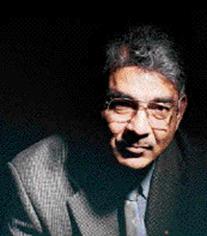Invited Speakers (in alphabetical order) 1. Zoubin Ghahramani Professor of Information Engineering Cambridge University, UK TITLE: Nonparametric Bayesian Machine Learning BIO:
Zoubin Ghahramani is Professor of Information Engineering at the University of Cambridge, UK, and is also Associate Research Professor of Machine Learning at Carnegie Mellon University, USA. His current research focus is on Bayesian approaches to statistical machine learning, with applications to bioinformatics, econometrics, and information retrieval. He has served on the editorial boards of several leading journals in the field, including JMLR, JAIR, Annals of Statistics, Machine Learning, and Bayesian Analysis. He is Associate Editor in Chief of IEEE Transactions on Pattern Analysis and Machine Intelligence, currently the IEEE's highest impact journal. He also serves on the Board of the International Machine Learning Society, and as Program Chair (2007) and General Chair (2011) of the International Conference on Machine Learning.† 2. Tom M. Mitchell E. Fredkin University Professor Machine Learning Department Carnegie Mellon University TITLE: Learning to Read the Web BIO:
Tom M. Mitchell is the E. Fredkin University Professor and head of the Machine Learning Department at Carnegie Mellon University. His research interests lie in machine learning, natural language processing, artificial intelli- gence, and cognitive neuroscience. Mitchell is a member of the U.S. National Academy of Engineering, a fellow of the American Association for the Advancement of Science (AAAS), and a fellow and Past President of the Association for the Advancement of Artificial Intelligence (AAAI). Mitchell believes the field of machine learning will be the fastest growing branch of computer science during the 21st century. 3. Ishwar K. Sethi Oakland University, USA TITLE: Title to appear shortly BIO:
Ishwar K. Sethi is currently a professor and chair of the Department of Computer Science and Engineering at Oakland University in Rochester, Michigan, a position he has held since 1999. From 1982 to 1999, he was with the Department of Computer Science at Wayne State University, Detroit, Michigan. Before that, he was a faculty member at Indian Institute of Technology, Kharagpur, India, where he received his Ph.D. degree in 1978. His current research interests are in data mining, pattern classification, and multimedia information indexing and retrieval. He has graduated over 20 doctoral students and has authored or coauthored over 150 journal and conference articles. He has served on the editorial boards of several prominent journals including IEEE Trans. Pattern Analysis and Machine Intelligence, and IEEE Multimedia. He was elected IEEE Fellow in 2001 for his contributions in artificial neural networks and statistical pattern recognition. 4. Gheorghe Tecuci George Mason University, USA TITLE: Cognitive Agents that Learn, Tutor, and Assist in Problem Solving BIO:
Gheorghe Tecuci is Professor of Computer Science in the Volgenau School of Information Technology and Engineering and Director of the Learning Agents Center at George Mason University http://lac.gmu.edu. He is also Visiting Professor and former Chair of Artificial Intelligence at the US Army War College, and a member of the Romanian Academy. Dr. Tecuci has followed a career-long interest in the development of a computational theory and technology that allows non-computer scientists to develop intelligent assistants that incorporate their problem solving expertise, and can assist them in problem solving and decision making. He has published over 175 papers with contributions to artificial intelligence and its applications, particularly instructable agents, multi- strategy learning with an evolving knowledge representation, integrated logic and probabilistic reasoning in uncertain and dynamic environments, mixed-initiative reasoning and collaborative problem solving, modeling expertsí reasoning, learning-based knowledge engineering, and intelligent tutoring systems. The application areas include intelligence analysis, military center of gravity determination, course of action critiquing, emergency response planning, critical thinking skills, financial services, medicine and personalized training.